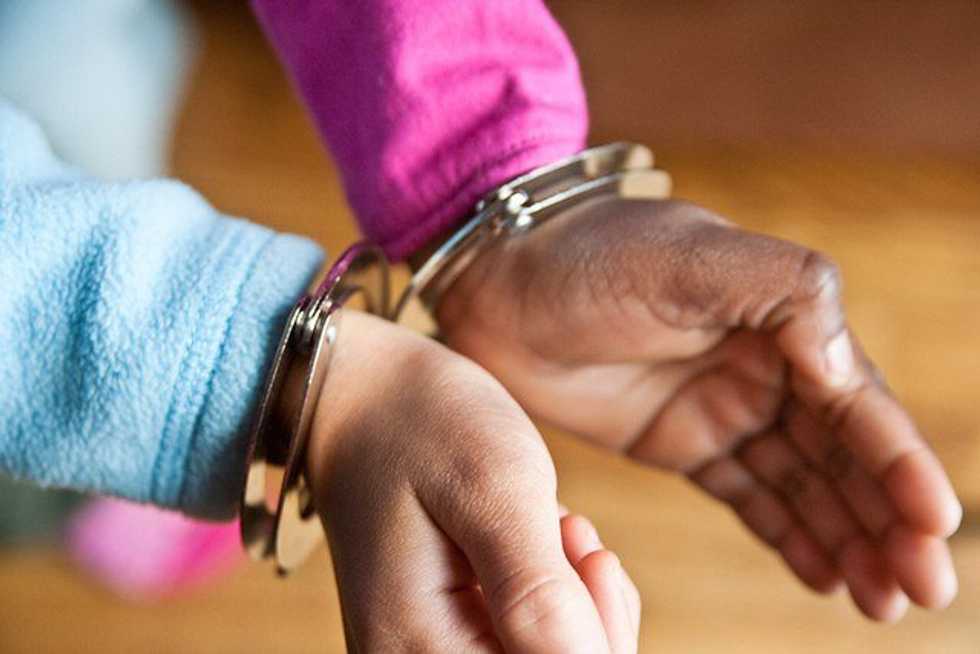His name is Kayleb. He was 11 years old. He kicked a trash can out of frustration--not an uncommon act, one may observe, and especially so, for an 11-year-old...and he was charged with disorderly conduct. Later, he walked out of a classroom without permission. Breaking the rules, yes, but nothing terribly out of the ordinary for an 11-year-old. Neither was it out of the ordinary for him to struggle to get out of a police officer's grasp when said officer wrestled the boy to the ground. Yet, he was handcuffed, arrested, and charged with a felony. Kayleb has autism and an IEP that perhaps could have been better consulted. He is now 12 years old, and undergoing court hearings and trials, for the crime of being autistic. By the way, did I mention that he's a child?
Speaking of children, she was 10 years old. Also autistic. She had what is now being described as an "outburst," as many people with autism (and without, especially at 10 years old) do. During this state of heightened emotions, she climbed a tree that touched the window of her classroom. She was not injured ... by the tree. She was, however, pinned to the ground by police officers in such a way that she reported not being able to breathe and then was handcuffed. Again, she is a child.
Autistic children aren't the only kids with disabilities being arrested for showing symptoms of that disability: two students with ADHD, 8 year old, S.R. and 9 year old, L.G., were arrested in Kentucky, and 12-year-old Cody with bipolar disorder was arrested and charged with assault for getting into a heated argument with classmates and his teachers.
Though children with disabilities of all races are more likely to have the police intervene in school affairs, the problem is especially problematic for Black students; the arrest of Black children with disabilities is disproportionate to the percentage of disabled students that Black students comprise.
Why?
Part of the fault lies in how police officers are trained and utilized. For one, officers are more likely to be stationed and dispatched in high-crime areas, which are often low-income; these areas tend to have a higher population of racial minorities, which will be reflected in the school population. Even still, this doesn't account for all of the disparity; racial profiling, in whatever forms and degrees it may exist in each individual district does seem to play at least some role.
On the matter of disability, police are often trained that any sign of resistance, or defiance, is an act of aggression toward the police officer...when in fact, such actions may simply be how the nature of the disability presents itself (with autism spectrum disorders, for example, the flight or fight response is often enhanced).
Now, my aim in mentioning this isn't to disparage law enforcement officials as a group; many such officers have only the best intentions and genuinely do their best to ensure the safety and well-being of all. But there are issues regarding what happens in those police academies and what happens in our schoolrooms, issues involved ableism and racism and a general lack of understanding, and these issues need to be illustrated so that they can be corrected.
Of course, the fault doesn't solely lie with this law enforcement officials. School systems across the country are overwhelmed and under-resourced. Ideally, a misbehaving or overwhelmed child would be sent to a separate area to "cool down," and a misbehaving or overwhelmed child with special needs would be helped by a professional or aide trained to handle such cases. However, there is a great shortage of Special Education professionals in comparison to the ever-growing rate of children in Special Education. Additionally, many teachers are under such pressure to keep teaching the curriculum at a steady and rapid pace that they don't have the time to stop class to handle any "classroom disruptions." When all of this happens, outside sources, such as the police, may be called.
"But, won't that teach them not to misbehave?" some may wonder.
In many of these cases, not really. Emotional dysregulation and impulse control aren't matters that can be reasoned with on an intellectual "I've enforced a consequence because you did X; therefore, you should not do X" basis. Many people with autism and similar conditions are perfectly aware of what the "rules" are (once they've been explained, of course), and most really want to follow those rules-- but the nature of having poor self-regulation makes that difficult, despite one's best efforts and intentions. Of course, people with these conditions can be taught ways to better manage this self-regulation and to recognize signs that they are growing overwhelmed and to better communicate this with others. Dialectal Behavior Therapy, for example, is showing some initial promise, as are many forms of behaviorist-based therapy. Handcuffs and criminals charges, however, aren't one of those ways.
In fact, such measures tend to lead to emotional trauma for the whole family. The 10-year-old girl now has a fear of police officers and thinks that they all "hate her;" Kayleb changed schools and is now reportedly doing "much better," but these proceedings have un-doubtful disrupted much of the past year or so that should have been spent on being a child and not worrying about felony charges. Yet another autistic child arrested at school, 8-year-old Colton, has frequent nightmares about the incident. This is not to mention the stigma that gets put into classmates' minds when they see their peer being dragged away by the police officer, especially when many are taught that the police only take away "bad people."
So, what do we do from here?
The major aspect of decreasing school-based arrests, especially those of disabled children, is to better equip our schools. Hiring more Special Education professionals would be a nice start; training Regular Education teachers on how to deal with their special education students may also help. This all, of course, entails better funding school systems.
Should police have to be called, which should only be in the most dangerous and out-of-control situations (leaving classrooms and climbing trees don't qualify), these law enforcement officials should also be better trained to deal with people with disabilities. In fact, Silver City, New Mexico and St. Paul, Minnesota are initiating such programs in their communities; parents already report a great feeling of safety about their children.
On both ends, being aware of racial disparity and any systematic racial prejudice and enforcing a more objective manner of determining what actions are taken and at what point may lessen the racial disparity latent in the matter. Community Tool Box's Cultural Competence and Spirituality in Community Building suggests celebrating racial and ethnic diversity in the classroom by celebrating holidays and customs from many cultures and by teaching the histories of many cultures; it also suggests actively addressing problems with school administrators (such as the racial disparity in disciplinary measures and police involvement). The Sentencing Project's Reducing Racial Disparity In The Criminal Justice System suggests keeping the policies and procedures of local law enforcement transparent to the community and allowing the community to discuss their concerns with law enforcement officials as well as such measures as ongoing cultural sensitivity trainings and examining existing procedures for cultural sensitivity and for proposed alternatives to arrests in situations where arrest is not absolutely necessary.
Parents, too, can benefit from receiving appropriate information. Most parents of children with disabilities are already fairly well aware of their child's symptoms, needs, and calming strategies; the PACER Center for children with disabilities, however, has put together an info packet that outlines some preventive measures (such as explicitly stating in the IEP that the police are not to be called) and some advice on the legal proceedings (such as what to discuss with attorneys, if they are needed) that some parents may not have been aware of.
Regardless of how this education and change in policy comes about, it needs to come soon. Children should have the freedom to play, to make mistakes, to have bad days, and to learn from those and develop new skills. Turning children into criminals isn't helping them or the community at all.





















